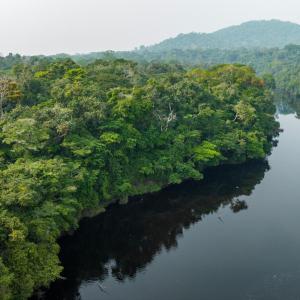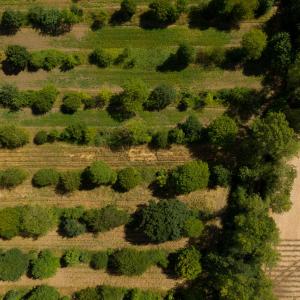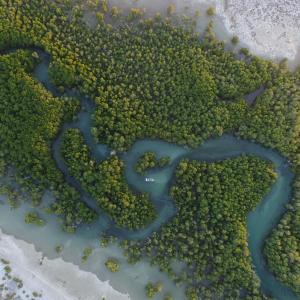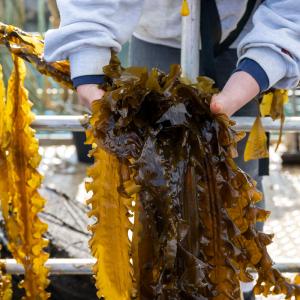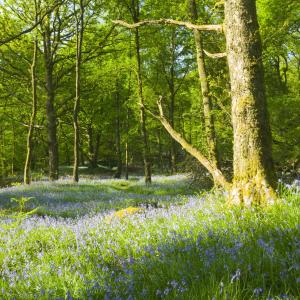
What are Nature-Based Solutions?
What are Nature-Based Solutions?
Nature-Based Solutions (NbS) are initiatives that work with and enhance nature to help address societal challenges, including tackling the climate and biodiversity crises and reducing poverty.
Healthy ecosystems – including forests, mangroves, peatlands and wetlands – produce a diverse range of benefits to human wellbeing, such as clean water, carbon sequestration and rural livelihoods. NbS are actions that are designed to help to protect or restore these ecosystems in ways that also deliver benefits for people and climate. They can be large or small, cover one ecosystem or several, and encompass a range of interventions.
Examples of Nature-Based Solutions

Mangroves
Mangroves
Mangroves protect communities and settlements from dangerous surges during tropical storms. They also store large amounts of CO2 and provide nurseries for many species of fish. Protecting and restoring mangroves can be a cost-effective means to mitigate and adapt to climate change, while also supporting biodiversity, food security, water quality and providing opportunities for leisure and tourism.

Regenerative Agriculture
Regenerative Agriculture
Regenerative agriculture techniques can enhance natural soil fertility and biodiversity: sequestering more CO2, reducing erosion and reliance on chemical fertilizers, while improving the livelihoods of farmers. Many conventional agricultural practices deplete nutrients and CO2 from soils and reduce biodiversity.

Forests
Forests
Forests sequester carbon, generate rainfall, harbour over 80% of the world’s terrestrial biodiversity and provide food, timber, medicines, and cultural and social value. Protecting and restoring forests can maintain and enhance these multiple benefits to people and the planet.
why an accelerator?
Currently some great examples of NbS exist, but these are often small-scale and face barriers to scaling up or widespread adoption. However NbS offer significant potential to help tackle the climate and biodiversity crises facing the planet, and to achieve the sustainable development goals. The 2021 UNEP State of Finance for Nature report estimates that current annual investment in NbS is $133bn, of which 86% comes from public finance. To meet the global targets to limit climate change and halt biodiversity loss, this annual investment needs to triple by 2030 and quadruple by 2050. Achieving this will require both public and private finance to increase significantly. We seek to build and scale the NbS marketplace by creating systemic infrastructure to reduce transaction costs and drive higher volumes of NbS activity.
Specifically, we aim to:
1. Support development and piloting of business and investment models for NbS enterprises with high growth potential.
Address the lack of systematic support to identify and grow a selection of NbS business models and companies, thereby providing blueprints for replication.
2. Create the right incentives.
Advocating for critical reforms in global markets or specific places to create positive incentives for NbS and new commercial business opportunities.
3. Level the playing field.
The impact of NbS relative to business-as-usual practices is clouded by a plethora of unaligned standards; competing, often expensive, monitoring approaches: and a lack of transparency. New tools, systems and consistent metrics are needed to allow stakeholders to ’see the change’ and build confidence for increased investment in NbS .
4. Learn from, and share, best practices.
We recognise the need to draw on a range of disciplines and sources of expertise to help drive NbS to scale. We will create opportunities for effective knowledge sharing about governance, technical design, business and financial models, to learn from others and share what works, as well as what doesn’t.


Our Approach
Our Approach
We are working with projects around the world, connecting diverse real-world experience in implementing NbS to the latest science, and pushing for systemic change in how NbS are financed and implemented. A key focus is developing routes by which NbS can become “bankable” – developing models which can be scaled and replicated, and blend different sources of finance to become financially sustainable. NbS will not be implemented at the scale required through reliance on philanthropic spending. NbS must become the “new normal” for investors and governments in tackling climate change, protecting nature and achieving the Sustainable Development Goals.
Learn more about the projects taking part in the Nature-based Solutions Accelerator here

The NBS Accelerator team
The NBS Accelerator team
In WWF UK the NbS team has diverse expertise designed to support the development of high quality, large scale and sustainably funded NbS interventions and forest protection and restoration more broadly. This includes expertise on the IUCN Global Standard on NbS, assessments and design of high quality FLR, the latest scientific knowledge on forests, agriculture, wetlands and more, and the building of commercial models and investment propositions for NbS projects. We benefit from global partnerships with global banks, think tanks, universities and other global conservation organisations.
